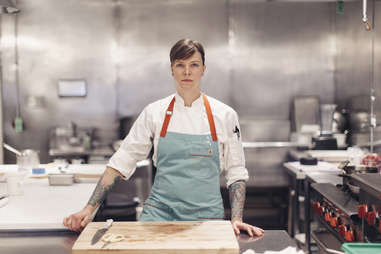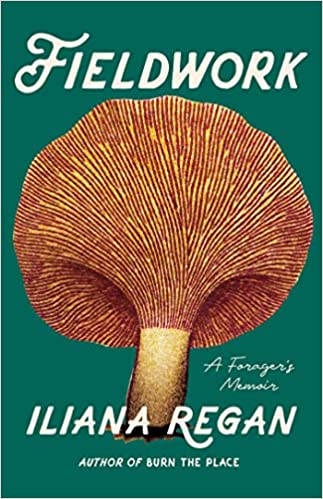
Iliana Regan
Born: Merrillville, Indiana 1979
Connection to Illinois: Regan earned a degree in Creative writing at Columbia College Chicago. In the spring of 2022, she earned her MFA from the School of the Art Institute of Chicago. She opened the Michelin star restaurant, Elizabeth, in Chicago's Lincoln Square in 2012. Biography: Iliana Regan is the Michelin-star chef and prior founder and owner of Elizabeth restaurant, which she turned over to her employees in 2020 in order to run the Milkweed Inn bed and breakfast in Michigan’s Upper Peninsula and experience a quieter life. In 2019 her debut memoir, Burn the Place, was longlisted for the National Book Award, the first time a food writer was listed since Julia Child won in the year Regan was born, 40 years ago. In addition to working as the chef and owner of Milkweed Inn, she recently earned a Masters of Fine Arts in Writing from the School of the Art Institute of Chicago. Her cuisine highlights her midwestern roots and the pure flavor of the often-foraged ingredients of her upbringing. A James Beard Award and Jean Banchet Award nominee, Regan was named one of Food & Wine’s Best New Chefs 2016.
Awards:
- Burn the Place: A Memoir LONGLISTED FOR THE 2019 NATIONAL BOOK AWARD
Web: https://www.instagram.com/ilianaregan_and_co/
Wikipedia: https://en.wikipedia.org/wiki/Iliana_Regan
Selected Titles
 |
Burn the Place: A Memoir ISBN: 1572842679 OCLC: 1080249054 Agate Midway 2019 A singular, powerfully expressive debut memoir that traces one chef’s struggle to find her place and what happens once she does.Burn the Place is a galvanizing memoir that chronicles Iliana Regan’s journey from foraging on the family farm to running her Michelin-starred restaurant, Elizabeth. Her story is raw like that first bite of wild onion, alive with startling imagery, and told with uncommon emotional power.Regan grew up the youngest of four headstrong girls on a small farm in Northwest Indiana. While gathering raspberries as a toddler, Regan preternaturally understood to pick just the ripe fruit and leave the rest for another day. In the family’s leaf-strewn fields, the orange flutes of chanterelles beckoned her while they eluded others.Regan has had this intense, almost otherworldly connection with food and the earth it comes from since her childhood, but connecting with people has always been more difficult. She was a little girl who longed to be a boy, gay in an intolerant community, an alcoholic before she turned twenty, and a woman in an industry dominated by men—she often felt she “wasn’t made for this world,” and as far as she could tell, the world tended to agree. But as she learned to cook in her childhood farmhouse, got her first restaurant job at age fifteen, taught herself cutting-edge cuisine while running a “new gatherer” underground supper club, and worked her way from front-of-house staff to running her own kitchen, Regan found that food could help her navigate the strangeness of the world around her.Regan cooks with instinct, memory, and an emotional connection to her ingredients that can’t be taught. Written from that same place of instinct and emotion, Burn the Place tells Regan’s story in raw and vivid prose and brings readers into a world—from the Indiana woods to elite Chicago kitchens—that is entirely original and unforgettable. |
 |
Fieldwork: A Forager’s Memoir ISBN: 1572843187 OCLC: 1351691073 Agate Midway 2023 From National Book Award–nominee Iliana Regan, a new memoir of her life and heritage as a forager, spanning her ancestry in Eastern Europe, her childhood in rural Indiana, and her new life set in the remote forests of Michigan’s Upper Peninsula. Fieldwork explores how Regan’s complex gender identity informs her acclaimed work as a chef and her profound experience of the natural world.Not long after Iliana Regan’s celebrated debut, Burn the Place, became the first food-related title in four decades to become a National Book Award nominee in 2019, her career as a Michelin star–winning chef took a sharp turn north. Long based in Chicago, she and her new wife, Anna, decided to create a culinary destination, the Milkweed Inn, located in Michigan’s remote Upper Peninsula, where much of the food served to their guests would be foraged by Regan herself in the surrounding forest and nearby river. Part fresh challenge, part escape, Regan’s move to the forest was also a return to her rural roots, in an effort to deepen the intimate connection to nature and the land that she’d long expressed as a chef, but experienced most intensely growing up.On her family’s farm in rural Indiana, Regan was the beloved youngest in a family with three much older sisters. From a very early age, her relationship with her mother and father was shaped by her childhood identification as a boy. Her father treated her like the son he never had, and together they foraged for mushrooms, berries, herbs, and other wild food in the surrounding countryside—especially her grandfather’s nearby farm, where they also fished in its pond and young Iliana explored the accumulated family treasures stored in its dusty barn. Her father would share stories of his own grandmother, Busia, who’d helped run a family inn while growing up in eastern Europe, from which she imported her own wild legends of her native forests, before settling in Gary, Indiana, and opening Jennie’s Café, a restaurant that fed generations of local steelworkers. He also shared with Iliana a steady supply of sharp knives and—as she got older—guns.Iliana’s mother had family stories as well—not only of her own years marrying young, raising headstrong girls, and cooking at Jennie’s, but also of her father, Wayne, who spent much of his boyhood hunting with the men of his family in the frozen reaches of rural Canada. The stories from this side of Regan’s family are darker, riven with alcoholism and domestic strife too often expressed in the harm, physical and otherwise, perpetrated by men—harm men do to women and families, and harm men do to the entire landscapes they occupy.As Regan explores the ancient landscape of Michigan’s boreal forest, her stories of the land, its creatures, and its dazzling profusion of plant and vegetable life are interspersed with her and Anna’s efforts to make a home and a business of an inn that’s suddenly, as of their first full season there in 2020, empty of guests due to the COVID-19 pandemic. She discovers where the wild blueberry bushes bear tiny fruit, where to gather wood sorrel, and where and when the land’s different mushroom species appear—even as surrounding parcels of land are suddenly and violently decimated by logging crews that obliterate plant life and drive away the area’s birds. Along the way she struggles not only with the threat of COVID, but also with her personal and familial legacies of addiction, violence, fear, and obsession—all while she tries to conceive a child that she and her immune-compromised wife hope to raise in their new home.With Burn the Place, Regan announced herself as a writer whose extravagant, unconventional talents matched her abilities as a lauded chef. In Fieldwork, she digs even deeper to express the meaning and beauty we seek in the landscapes, and stories, that reveal the forces which inform, shape, and nurture our lives. |




